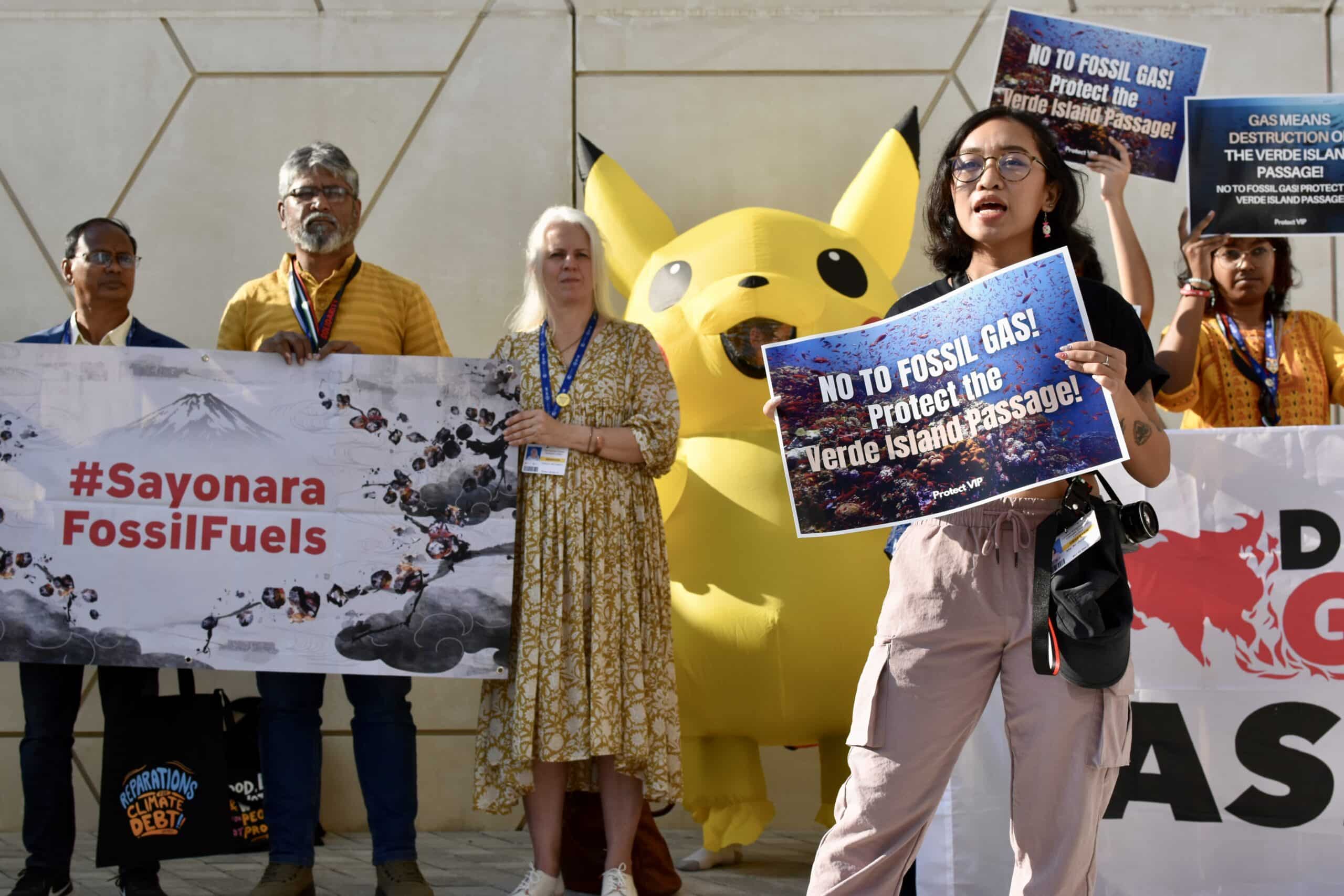
Community activists speak out against harm caused by Japanese-financed fossil fuel projects
A global coalition of civil society groups organized a demonstration at the COP28 climate negotiations in UAE on “Finance Day” to demand that the Japanese government stop financing new fossil fuel projects and shift support to renewable energy. The action featured activists wearing inflatable Pikachu costumes and a slogan calling on Japan to say #SayonaraFossilFuels.
Despite the urgent need to phase out fossil fuels, Japan is driving the expansion of liquified gas (LNG) and other fossil-based technologies like ammonia co-firing across Asia and globally. This will worsen the climate crisis and harm communities and ecosystems. Communities and movements are rising up – particularly in the Global South – to oppose Japan’s efforts to derail the transition to renewable-based energy systems.
During his COP28 speech, Japanese Prime Minister Kishida promoted the Asia Zero Emissions Community, a framework for encouraging governments in the region to increase reliance on LNG and other fossil-based technologies in their own national decarbonization and energy plans. Prime Minister Kishida is convening an ASEAN/Japan 50th Anniversary Summit on December 16-18 after COP to further encourage Southeast Asian heads of state to back Japan’s fossil fuel-based technologies.
Japan is the world’s second largest provider of international public finance for fossil fuels, according to a new backgrounder by Oil Change International. Japan spent at least USD 6.9 billion on new oil, gas, and coal projects each year on average from 2020 to 2022. Japan is also the world’s largest provider of international public finance of fossil gas and has been driving the expansion of gas across Asia and globally. Japan is also the world’s top provider of international public finance for LNG export capacity, providing 50% of global international public finance, or $39.7 billion, for LNG export capacity projects built from 2012 to 2022 and projects under construction or expected to be built by 2026.
The International Energy Agency’s (IEA) authoritative World Energy Outlook 2023 shows oil, gas, and coal demand plateauing this decade, and confirms that no new oil and gas investment can be permitted if the world is to keep to the 1.5 degree Celsius goal of the Paris Agreement.
Statements:
Hiroki Osada, Development Finance and Environment Campaigner, Friends of the Earth Japan: “It’s time to say Sayonara to fossil fuels, but Japan has been failing to do so. It has been the biggest financier of the climate crisis in the world, and by doing so destroyed local communities and environments around the Verde Island Passage in the Philippines, the Gulf coast in the U.S., to name just a few. Japan’s push for fossil fuels is vigorously opposed by people around the world, as witnessed in this action in Dubai. Japan, it’s time to say Sayonara to fossil fuels.”
Lidy Nacpil, Coordinator, Asian Peoples’ Movement on Debt and Development:
“It is despicable that Japan still clings to its outdated and destructive ways over the needs of the planet and the Global South. While Japan has placed its dirty energy projects in various Asian countries, communities did not ask for the environmental impact of these projects to be dumped onto them. The fossil fuel giant is willingly leading the region towards climate collapse through its false solutions like hydrogen and ammonia co-firing, and we simply do not accept this. Countries like Indonesia, Bangladesh, Vietnam and the Philippines have had enough of fossil fuels, and demand nothing less than a complete phase out of fossil-based energy systems and a rapid, equitable, and just transition towards renewable energy to save us from this crisis.”
Krishna Ariola, Founding Convenor, Youth for Climate Hope, Philippines:
“Japan’s $10 million loss and damage pledge is nothing compared to the billions it spends to endanger countries like the Philippines with its fossil fuel obsession. Japanese financiers are blocking the energy transition in Southeast Asia by fueling its gas boom. In the Philippines, Japan is using public funds to help destroy our own Amazon of the oceans, Verde Island Passage, with LNG. Japan’s push for false solutions also risks tying us to decades more of fossil fuels, even when a 100% transition to renewables can already be underway. Japan owes it to vulnerable nations to deliver climate leadership, but it chooses instead to rob the hope for a livable future from generations to come.”
Susanne Wong, Asia Program Manager, Oil Change International, United States:
“Japan is placing corporate profits above the health and well being of our communities and our planet. Japan is promoting dangerous distractions like LNG, ammonia co-firing and CCS across Asia and globally. These technologies will expand and prolong the use of fossil fuels and waste precious time and resources to mitigate the climate crisis. Japan will face increasing international scrutiny and pressure until it finally says sayonara fossil fuels.”
Sharif Jamil, Coordinator, Waterkeepers Bangladesh, Bangladesh:
“This is so unfortunate that the largest development partner of Bangladesh since its independence in 1971, Japan, is going to do the most significant harm for this nation by preparing an imported fossil fuels-based energy master plan with false solutions to the climate crisis and unproven technologies while the whole country is an untapped energy mine in terms of renewable potential. The Integrated Energy and Power Master Plan (IEPMP) ignored our science-based arguments and recommendations during the formation process for the IEPMP and Strategic Environmental Assessment (SEA) for the South East region of Bangladesh to manipulate critical environmental and social impacts by the plan and projects they are currently developing here. We demand complete revision of the IEPMP and SEA.”
John Beard, Jr., frontline Texas resident and founder of Port Arthur Community Action Network, United States:
“The United States claims its fracked LNG exports are cleaner and safer than other sources. But there is no clean or safe way to produce, process, and export this deadly fuel. My community has some of the highest cancer rates in the world and suffers from exposure to this toxic fracked gas, all so Japan can wreck the climate and hold back the world from meeting its Paris targets. Japan’s investments will only further hurt people in the United States, from Indigenous tribes in the Southwest to those living near the ports of Texas, Louisiana, and Mexico.”
Erin Ryan, Senior International Campaigner, Solutions for Climate Australia:
“Far from financing the energy transition we need, Japanese investment is propping up Australia’s fossil gas export industry. On top of this, Japan is sinking its diplomatic resources into undermining Australian energy policy and poking loopholes into our net zero emission rules for new gas fields. The impact on our home is twofold; we’re facing the destruction of marine parks and sacred Tiwi land and waterways, and are bracing for yet another brutal, fossil-fuelled bushfire season. It’s time to say sayonara to Japan’s fossil fuel addiction.”
Masayoshi Iyoda, Japan Campaigner, 350.org:
“While Prime Minister Kishida announced his support for tripling renewable energy by 2030 at COP28, Japan has played the role of merchant in the selling of false solutions such as ammonia co-firing with dirty coal, dangerous nuclear, and CCS/CCUS in the Asia region. It is hard to understand why Kishida did not mention “fossil fuel phase-out” in the speech, which was agreed at the G7 Hiroshima summit 2023 hosted by PM Kishida.
The science has made it clear, there is no room for prolonging the lifetime of fossil fuels, it’s time for people in Asia to speak up and take action for community-led renewables. Japan needs to provide financial support in order and make this a possibility.”
Photos for use are available here.
***
Resources:
- “Backgrounder: Japan’s fossil finance threatens to derail the energy transition in Asia and globally,” Oil Change International, November 2023 (available in English and Japanese)
- Confronting a Fossil Future: Stopping the Gas Detour in Renewable-Rich Southeast Asia reveals Japan’s heavy hand in the gas boom in SEA. Center for Energy, Ecology and Development, December 2023

